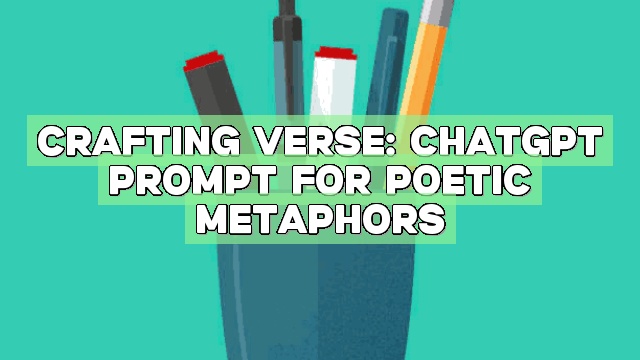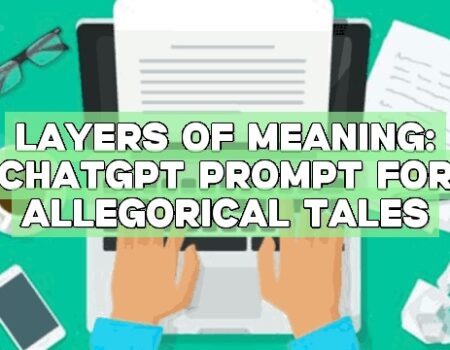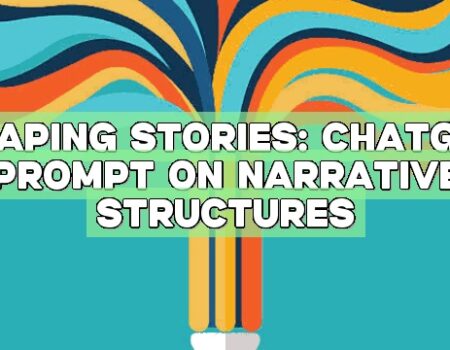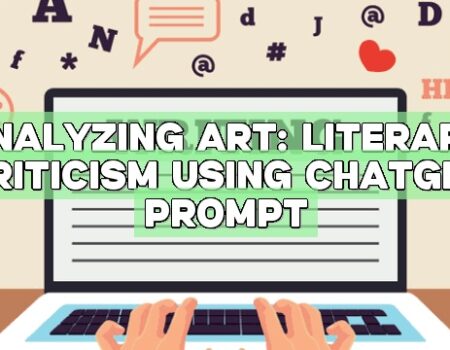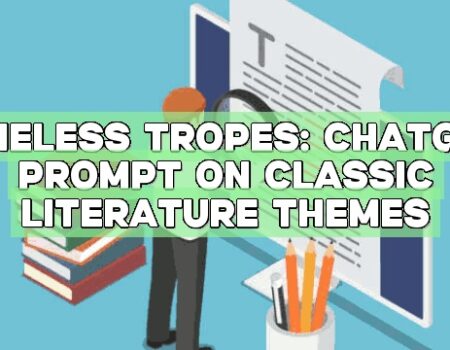As writers, we know that crafting verse takes a lot of linguistic creativity and literary skills. To enhance our abilities as poets, we should explore the depths of language and experiment with different techniques to create vivid imagery in our poems. One tool that can aid us in this journey is ChatGPT prompts for poetic metaphors.
ChatGPT uses state-of-the-art technology to generate unique writing prompts that can inspire creative thinking in the realm of poetry. By tapping into the power of language, writers can unleash their creativity and generate compelling metaphors that leave a lasting impact on readers.
Key Takeaways
- Using ChatGPT prompts can help writers generate unique poetic metaphors.
- Poetic metaphors enhance the effectiveness of poems and create powerful images in the reader’s mind.
- Exploring language and its nuances can help writers craft complex metaphors and advance their literary skills.
Unleashing Creativity with ChatGPT
As writers, we all have our moments of creative block where ideas seem to elude us. This is where ChatGPT comes in handy. This AI-powered writing tool is designed to help writers tap into their creativity and generate unique poetic metaphors.
Using ChatGPT prompts can inspire creative thinking in the realm of poetry. The tool is programmed to generate prompts that writers can use to explore metaphors and create vivid imagery. With its vast database of prompts, ChatGPT can help writers unleash their creativity in ways they never thought possible.
Examples of ChatGPT prompts in action:
Let’s say you’re stuck on a writing project. You can use ChatGPT to generate a prompt such as “Compare the ocean to a living organism.” This prompt encourages you to view the ocean as more than just a body of water, but rather a living entity with its own personality and characteristics. From here, you can explore different metaphors that help bring the ocean to life in your writing.
Another example of a ChatGPT prompt is “Write a poem about a rose without using the word ‘rose’.” This prompt challenges writers to think outside the box and explore new ways of describing an object that is often associated with cliché language.
By using these prompts, writers can push their creative boundaries and develop unique metaphors that are not only captivating but also thought-provoking.
Understanding Poetic Metaphors
Poetic metaphors are an essential component of poetry and aim to elicit an emotional response from the reader. They are figurative expressions which use comparisons between two seemingly unrelated things to evoke a deeper understanding and meaning. Poets utilize these metaphors to create vivid imagery and communicate complex emotions and ideas.
Understanding metaphors is essential for readers to appreciate the depth of the poetry. Through poetic metaphors, poets use language to paint pictures in the reader’s mind. They can create a powerful emotional response and provoke thought and introspection.
At its core, a metaphor is a figure of speech that uses an analogy to compare two things. They are used to describe something in a way that is not literal, but rather figurative. For instance, “Her eyes were stars” is a metaphor that compares the brightness and sparkle in a person’s eyes to the stars in the sky.
Poets rely on metaphors to bring their poems to life. These metaphors add depth, richness, and complexity to the artwork, enabling them to communicate complex emotions and ideas that might be difficult to express through mere words.
Crafting Metaphors with ChatGPT Prompts
One of the most valuable features of ChatGPT is its ability to generate unique and creative prompts that can inspire writers to craft powerful metaphors. By harnessing the power of artistic language, poets can create vivid imagery that engages readers and evokes strong emotions. In this section, we will explore how to use ChatGPT prompts to craft metaphors and take your poetry to the next level.
Using ChatGPT Prompts for Crafting Metaphors
To get started with crafting metaphors using ChatGPT, you can simply input a word or phrase related to your topic or theme. ChatGPT will generate a list of prompts based on your input, which can be used as a starting point for crafting metaphors. Here is an example:
| Input | Prompt Generated by ChatGPT |
|---|---|
| Love | “Love is an ocean of emotions.” |
Once you have a prompt generated by ChatGPT, you can start thinking about how to use it to craft a powerful metaphor. For example, you could use the prompt “Love is an ocean of emotions” to create a metaphor like “Her heart was a ship sailing through the vast ocean of love.”
Approaching ChatGPT Prompts Creatively
While ChatGPT can generate prompts to spark ideas, it’s important to approach them with creativity and originality. Rather than simply using the prompt as is, take the time to think about how you can put your own spin on it.
For instance, if your prompt is “The sun is a blazing inferno,” you could try using unexpected imagery to create a more unique and intriguing metaphor. Instead of simply comparing the sun to fire, you might say “The sun was a fiery furnace, burning brightly in the sky.”
By taking a creative approach to ChatGPT prompts, you can craft metaphors that are truly original and engaging.
Exploring the Depths of Language
Language is a powerful tool for poets, and utilizing it to its fullest potential can greatly enhance the effectiveness of poetic metaphors. Exploring language allows writers to tap into their linguistic creativity, delving into the nuances of grammar, syntax, and sentence structure to craft unique and evocative metaphors.
By experimenting with different words, phrases, and combinations, writers can evoke vivid imagery in their poems, painting a picture in the reader’s mind with each line. This exploration of language can also lead to the development of a unique voice, separating the poet from others in their craft and allowing them to shine in their own right.
For poets looking to expand their linguistic horizons, ChatGPT can be a valuable tool. By utilizing the prompts provided by the AI language model, writers can push the boundaries of their vocabulary, exploring new words and phrases that they may not have otherwise considered. This can often lead to unexpected and powerful metaphors, deepening the overall impact of the poem.
Emphasizing Linguistic Creativity
At the heart of exploring language is the idea of linguistic creativity. This involves the ability to experiment with language, pushing it to its limits in an effort to evoke powerful and lasting emotions in the reader.
As writers delve deeper into their own linguistic creativity, they are often able to craft metaphors that are more nuanced and complex, allowing them to build a deeper connection with the reader. By continuing to explore language and push themselves creatively, poets can continue to hone their skills and produce truly exceptional works of art.
Advancing Literary Skills with ChatGPT
Using ChatGPT prompts for crafting poetic metaphors can provide writers with a unique opportunity to advance their literary skills. Not only can they expand their vocabulary, but they can also develop a unique voice and practice the art of expression.
One of the primary benefits of using ChatGPT prompts is that they can inspire writers to think more deeply and creatively. By tackling prompts that challenge their linguistic creativity, writers can hone their ability to use language to communicate powerful ideas and emotions.
Additionally, using ChatGPT to create poetic metaphors allows writers to explore literary techniques and experiment with different forms of figurative language. They can learn to use similes, metaphors, personification, and other techniques to create vivid imagery and evoke strong emotions in their readers.
As writers work with ChatGPT prompts, they can also become more comfortable with exploring different poetic structures and forms. They can learn the nuances of sonnets, haikus, free verse, and other forms of poetry, helping them to craft more sophisticated and complex works.
Overall, using ChatGPT prompts to create poetic metaphors can be an incredibly effective way to advance one’s literary skills. Whether writers are just starting out or looking to refine their craft, ChatGPT can be an invaluable tool in the journey towards becoming a more skilled and expressive poet.
Building Complex Metaphors
In poetry, metaphors can be simple, but they can also be complex. By building complex metaphors, you can take your poetry to the next level. ChatGPT prompts can help you craft more intricate and sophisticated metaphors, which will add depth and complexity to your work.
One way to build complex metaphors is to use multiple comparisons. For example, instead of saying “she was a butterfly,” you could say “she was a butterfly with the heart of a lion and the wings of an angel.” This allows you to combine different concepts and create a unique and powerful image in your reader’s mind.
Another way to build complex metaphors is to use extended metaphors. An extended metaphor is a metaphor that is developed over multiple lines or stanzas. This can be particularly effective when discussing abstract concepts or emotions. For example, you could use an extended metaphor of a journey to explore the idea of personal growth.
When building complex metaphors, it’s important to keep your focus on the central idea you want to communicate. You don’t want to overload your readers with too many comparisons or stray too far from your main point.
Steps for Building Complex Metaphors
Here are some steps you can take to build complex metaphors using ChatGPT prompts:
- Start with a ChatGPT prompt to generate your primary metaphor.
- Think about the various elements of your metaphor and how they can be expanded upon or combined with other ideas.
- Brainstorm other comparisons that can complement or contrast your primary metaphor.
- Experiment with different phrasings and word choices to find the most effective way to communicate your ideas.
- Edit and refine your metaphor until it is complex but still focused and coherent.
By following these steps, you can create complex metaphors that will captivate your readers and elevate your poetry to new heights.
Showcasing Poetic Metaphors in Practice
Using ChatGPT prompts to craft poetic metaphors can result in unique and powerful imagery that resonates with readers. Let’s explore some real-life examples of poems that showcase the effectiveness of this technique.
“I am not a morning person,”
she said, with a yawn like a cave-Katherine Larson, “Kepler-186f”
In this example from Katherine Larson’s poem “Kepler-186f,” the ChatGPT prompt likely inspired the poet to compare her yawn to a cave. This metaphor is fantastic because it creates an image in the reader’s mind of a wide, gaping hole in the earth that swallows the sound of a yawn. The use of metaphor allows the poet to convey her idea more vividly than if she had simply said “she yawned widely.”
Another great example comes from “The Journey” by Mary Oliver:
“But little by little,
as you left their voices behind,
the stars began to burn
through the sheets of clouds,
and there was a new voice
which you slowly
recognized as your own,
that kept you company
as you strode deeper and deeper
into the world,
determined to do
the only thing you could do
– determined to save
the only life you could save.”
-Mary Oliver, “The Journey”
Here the ChatGPT prompt could have encouraged Mary Oliver to compare the protagonist’s inner voice to the stars that burn through the clouds. This metaphor works because it conveys a sense of hope and inspiration – just as the stars shine through the darkness, the protagonist’s inner voice guides them through a difficult journey. Metaphors like this help to elevate a poem from simple description to a powerful emotional statement.
Overall, these examples demonstrate the potential power of using ChatGPT prompts to generate unique metaphors in poetry. By tapping into the vast vocabulary and linguistic creativity available through ChatGPT, poets can create imagery that is both evocative and effective.
Engaging Readers with Evocative Metaphors
One of the biggest advantages of crafting metaphors using ChatGPT prompts is the ability to engage readers with evocative and meaningful language. When readers encounter a well-crafted metaphor, they are transported into the world of the poem and gain a deeper understanding of the emotions and ideas being expressed.
Using evocative metaphors allows writers to create vivid imagery that resonates with readers. By painting a picture with words, writers can tap into the power of the senses and elicit strong emotional responses from their audience. This can be particularly effective in poetry, where metaphors are often used to convey complex emotions that defy direct explanation.
When using ChatGPT prompts to create metaphors, writers are encouraged to think outside the box and explore new and unexpected connections between ideas. This can lead to metaphors that surprise and delight readers, leaving a lasting impression and prompting them to think deeply about the themes and messages in the poem.
Ultimately, crafting evocative metaphors is about creating a connection with the reader. When readers feel that the writer truly understands and shares their emotions and experiences, they are more likely to be moved by the poetry and to engage with it on a deeper level.
Empowering Your Poetry with ChatGPT
As a poet, your words have the power to move, inspire, and transform. With the help of ChatGPT, you can tap into your creative instincts and unlock your full potential as a wordsmith. By using ChatGPT prompts for poetic metaphors, you can empower your poetry and take it to the next level.
ChatGPT is a tool that allows you to generate unique and thought-provoking prompts to inspire your writing. By using these prompts for poetic metaphors, you can stretch your linguistic creativity and experiment with new ways to express your thoughts and emotions.
Not only can ChatGPT help you unleash your creativity, but it can also elevate your literary skills. By expanding your vocabulary and developing your unique voice, you can improve your ability to express yourself through words. And by practicing the art of expression, you can become a more confident, skilled, and impactful poet.
With ChatGPT, you can explore the depths of language and create evocative metaphors that resonate deeply with readers. Whether you’re crafting simple or complex metaphors, ChatGPT can guide you through the process and help you unlock your potential as a poet.
So if you want to empower your poetry and take it to the next level, consider using ChatGPT for poetic metaphors. With its help, you can find your voice, refine your skills, and create poetry that moves readers and changes lives.
FAQ
Q: How can ChatGPT prompts be used for crafting poetic metaphors?
A: ChatGPT prompts can be used as a source of inspiration for generating unique and creative poetic metaphors. By providing a starting point for writers, ChatGPT prompts can help unlock linguistic creativity and expand literary skills.
Q: What is the importance of linguistic creativity in crafting verse?
A: Linguistic creativity is essential in crafting verse as it allows writers to find unique and captivating ways to express their thoughts and ideas. It helps create original and evocative metaphors that enhance the poetic impact of the writing.
Q: How can ChatGPT help unleash creativity for poets?
A: ChatGPT can help poets unleash their creativity by providing prompts that encourage unique thinking and the exploration of language. It offers a tool for writers to tap into their imagination and create poetic metaphors that may have otherwise remained unexplored.
Q: What are poetic metaphors and how do they enhance poems?
A: Poetic metaphors are figures of speech that compare two seemingly unrelated things to create a deeper understanding or evoke vivid imagery. They enhance poems by adding layers of meaning, creating emotional impact, and engaging readers on a more profound level.
Q: Can you provide specific examples of ChatGPT prompts for crafting metaphors?
A: Some examples of ChatGPT prompts for crafting metaphors include “Write a poem that compares a sunset to a blazing bonfire” or “Create a metaphor that describes love as a wildflower blooming in a concrete jungle.” These prompts serve as starting points for generating unique and expressive metaphors.
Q: How can writers explore the depths of language when crafting metaphors?
A: Writers can explore the depths of language by experimenting with different words, phrases, and combinations. By delving into the nuances of language, writers can create metaphors that evoke vivid images and emotions, adding depth and richness to their poetry.
Q: What benefits can using ChatGPT prompts for poetic metaphors bring to advancing literary skills?
A: Using ChatGPT prompts for poetic metaphors can advance literary skills by expanding vocabulary, developing a unique voice, and practicing the art of expression. It encourages writers to think critically and creatively, ultimately enhancing their ability to craft powerful and impactful poetry.
Q: How can writers build complex metaphors using ChatGPT prompts?
A: To build complex metaphors using ChatGPT prompts, writers can start by selecting prompts that involve multiple elements or concepts. They can then explore the relationship between these elements and find unique ways to connect them, creating intricate and thought-provoking metaphors.
Q: Can you provide examples of poems where ChatGPT prompts have been used to create captivating metaphors?
A: While specific examples may vary, poems that use ChatGPT prompts to create captivating metaphors often showcase imaginative and evocative language. These metaphors contribute to the overall artistic impact of the poetry by creating vivid imagery and engaging the readers’ emotions.
Q: How can well-crafted metaphors engage readers and evoke emotions?
A: Well-crafted metaphors engage readers by creating a connection between the abstract and the familiar, allowing them to experience the poem on a deeper level. These metaphors evoke emotions by drawing on shared human experiences, enabling readers to relate to the poem and its message.
Q: What are the benefits of using ChatGPT prompts for poetic metaphors?
A: Using ChatGPT prompts for poetic metaphors empowers poets to refine their skills, expand their creative boundaries, and embrace the power of language. It provides a valuable tool for self-expression, fostering growth and exploration within the realm of poetry.



